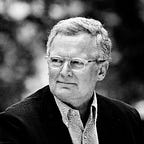A working class manifesto
Gregory Bateson wrote that the major problems in the world are the result of the difference between how nature works and how people think. Mainstream economics still sees the economy and society as ultimately predictable and controllable rational processes, although the repeated crises have shown how deeply flawed this view of the world is.
Today, more and more scholars see organizations as being more analogous to complex networks. There, it is not about predictions and controlled outcomes, but about uncertainty, perpetual co-creation and fundamental interdependence. Their claim is that we should study links and interactions. Many aspects of our social and economic world would start to look completely different from this complex network perspective.
Knowledge work is understood as creative work we do in interaction. Unlike the repetitive business processes we know so well, where inputs are acted on in some predictable, structured way and converted into outputs, the inputs and outputs of knowledge work are problem definitions and exploration for solutions. Even more, there are no predetermined task sequences that, if executed, would guarantee success.
Knowledge work is characterized by variety and exception rather than predictability and routine.
It is thus impossible to separate a knowledge process from its outcomes. Knowledge work is about human beings being more intensely present for each other. Thus, a post-industrial business today needs to be human-centric by definition. But people still tend to see their work and personal lives as two separate spheres.
Although this conflict is widely recognized, it is seen as an individual challenge, a private responsibility to manage. It is now time to challenge this and see the conflict as a systemic problem. It is a result of the factory logic, which saw human beings as resources and interchangeable parts of the main thing, the production machinery. The employee gave her time and skills to the employer for a certain period of time in exchange for money. The context and logic of work are dramatically different today. In knowledge work we need to create an explicit, new connection between work and personal life. We talked earlier about balancing work and life. Here we are talking about connecting work and life in a new way, with a new agenda. Human beings in interaction not the processes of production, are the main things, .
Traditional management thinking sets employee goals and business goals against each other. The manager is free to choose the goals, but the employee is only free to follow or not to follow the given goals. This is why employee advocates mainly want responsible employers, nothing else, and the employers want skilled employees who come to work with enthusiasm and energy, nothing else.
Must we then choose between the goals of the people or the goals of the business, or can the two sides be connected? As we know, passion and commitment are best mobilized in response to personal aspirations, not financial rewards. The aim, however, is not to have a single set of common goals, but complementary goals and a co-created narrative for both!
Linking personal lives with corporate issues may seem like an unexpected connection, or even a strange one. But if we don’t learn from psychology and cognitive neurosciences, and continue to try deal with each area separately, both individuals and organizations will suffer.
The lack of a connecting agenda may be one of the big, so far undiscussed, challenges facing the emerging post-industrial society.
We need to study the intersection of business strategy and personal narrative and use the new agenda to challenge our industrial-age practices and flawed ways of thinking. We are accustomed to taking work home, but what would the opposite be? Knowledge work needs people who are more fully present, people with responsibility and ownership.
We need an approach to work that appreciates whole human beings, their passions and voluntary participation. Rather than focusing on accountability, community design should concentrate on energizing, enriching participation.
The new structures of work and new designs for value creation are about communities continuously organizing themselves around shared information, shared interests and shared practices.
Post-industrial business is about doing meaningful things with meaningful people in a meaningful way.
.
